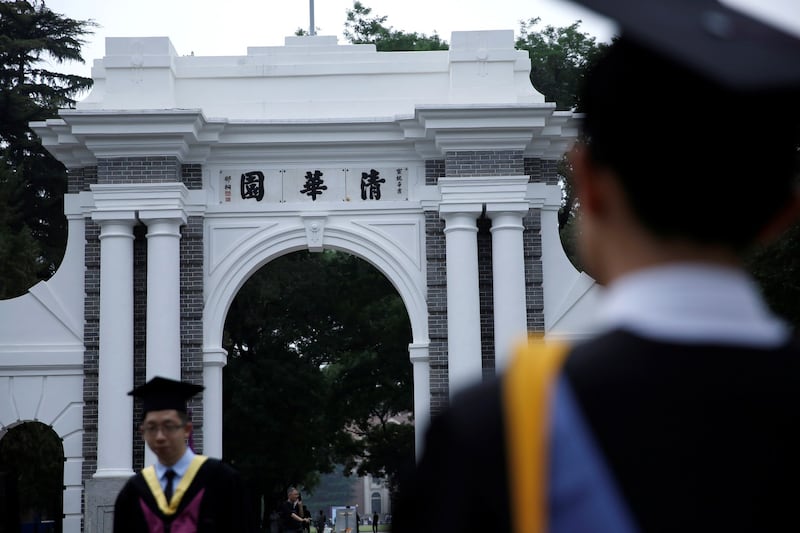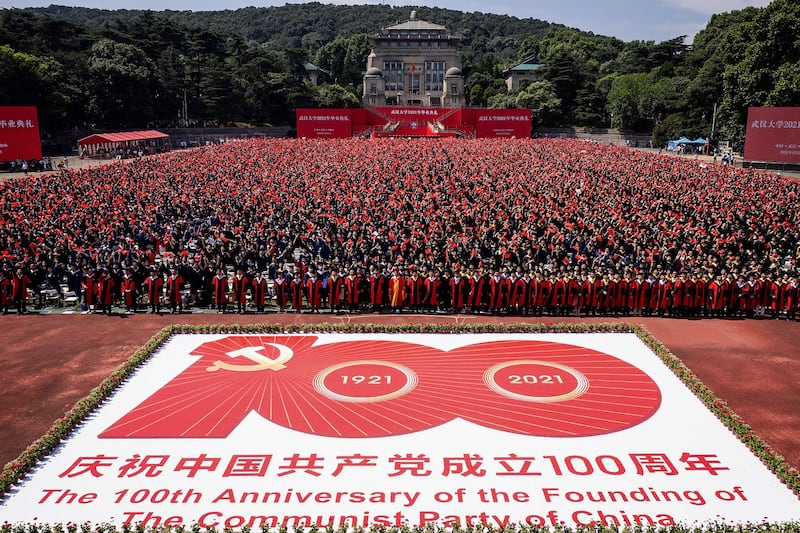The Chinese Communist Party is taking a direct role in the running of universities across the country amid ongoing mergers of embedded party committees with presidents' offices, Radio Free Asia has learned.
While the ruling party already has branches and committees embedded in universities and other academic institutions, commentators said it has never actually merged itself with administrative structures before, not even during the political turmoil of the Cultural Revolution.
The party committee at Beijing's Tsinghua University issued a notice on Jan. 14 announcing that its office had merged with the office of the university president to form a new Party Committee Office that would run the school.
Tsinghua's website was recently updated to reflect the changes, on a page titled "Departmental Overview.”
An employee who answered the phone at the new office on Jan. 15 confirmed that media reports about the change were accurate.
"[The merger happened] last year," the employee said.
And it’s not just Tsinghua. University employees and a review of school websites revealed that their announcement was just the latest in a nationwide movement that is being dubbed, "one institution, two brands."
Similar changes have been afoot in major universities across China, including Shanghai Jiaotong University, Southwest Jiaotong University, Sichuan University and Nanjing University, Beijing University of Aeronautics and Astronautics, Harbin Engineering University, Nanjing University of Science and Technology and Fuzhou University, among others, according to a review of their official websites by RFA Mandarin.
‘Socialist universities’
An employee who answered the phone at the Party and Government Office of Henan Normal University on Jan. 17 confirmed that the merger had already happened at that school, too.
"We now have the school office and the party office together, like party and government," she said, adding that the merger was completed "last year."

According to one official website, Shanghai Jiaotong University Party Secretary Jiang Sixian told an event in May 2023 that a similar merger at his school had been "efficient and orderly."
Jiang said that the party's Central Ideological and Political Conference on Colleges and Universities "has clearer and clearer requirements for running universities," and called on comrades to unify their thoughts and actions to reflect "socialist universities with Chinese characteristics."
An alumnus of Guizhou University who gave only the surname Chen for fear of reprisals said that the mergers were unprecedented, and that party and administration were run out of separate offices even during the political turmoil of the 1966-1976 Cultural Revolution, when he was a student.
"Back then, the party office was the party office, the school office was the school office, and academic and administrative affairs were all the preserve of the school office," Chen said.
"Each department had a party branch, and the party office handled the development of party members by the party branches in each department, making ideological reports, developing party members or convening party committee meetings,” he said. "Now the two offices are integrated into one.”
‘Two brands into one’
Veteran political journalist Gao Yu confirmed Chen's account, saying there was a clear division of labor between the two.
"I really didn’t expect that they would merge like this, turning two brands into one, under the unified leadership of the party," she said. "Now, the whole university must respond to education by the party and integrate politics into the core curriculum."
"It's the first time this has happened since the founding of the People’s Republic of China," Gao said.

An alumna of Shanghai's Fudan University who gave only the surname Sun for fear of reprisals said she remembers the move first being mooted in 2021, when the Ministry of Education set up an expert panel governing "ethics" in teaching.
The Chinese Communist Party started campaigning to end " immoral" behavior among its 98 million members in 2015, after General Secretary Xi Jinping took power.
More recently, university lecturers have been accused of "unethical" behavior if they criticize the government on social media.
"The National Expert Committee on building morality and good conduct among university lecturers met last year and they created this merger of university and party offices," Sun said.
The ministry last week wrapped up its 2024 National Education Work Conference second plenary session with a communique calling for greater participation by the Chinese Communist Party in "global education governance."
"[We must] accelerate the high-level opening up of education to the outside world, effectively participate in global education governance, and make full use of various platforms and stages to break new paths and create new space in the new international situation," it quoted education minister Huai Jinpeng as saying.
Huai said China had sounded a "clarion call" to "build a powerful country through education," which would be the top priority for the ministry this year.
Translated with additional reporting by Luisetta Mudie. Edited by Malcolm Foster
